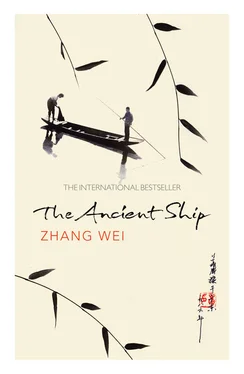All sounds came to a halt. The old woman grabbed her young son’s hand and rushed up to Fourth Master, taking tiny, rapid steps. She was choked with tears. Fourth Master took her hands in his and held them for several minutes, and as her shoulders slumped and heaved and quaked, she seemed to be getting smaller. She was too grief-stricken to speak for a moment. “Fourth Master,” she managed to say, “what happened to Dahu has upset you! What do I do? How do…I do it? I am fated to suffer, the whole Sui clan is fated to suffer. Fourth Master, this has upset you.” He let go of her hands and walked up to look at Dahu’s photograph, where he picked up a bundle of incense sticks and lit them, then bowed deeply as Zhang-Wang stepped out of the shadows and stood beside him. Her lips were pressed together more tightly than ever; her face looked very old as she glanced at the wrinkles on Fourth Master’s neck. Noticing a leaf on his clothes, she removed it.
Next to enter the hut were Luan Chunji and Li Yuming, who tried to console Dahu’s mother, telling her what a good son he was, the pride of Wali, and urged her not to be too sad; they wanted her to shun superstitions as much as possible. A little of that can’t hurt, they said, but her heroic son deserved something better. Overhearing what they said, Zhang-Wang narrowed her eyes and glared at them, exposing her black teeth. They quickly turned away.
No one else spoke, inside or outside of the hut, for a long while, for the most solemn moment had arrived. People outside could not see what Fourth Master was doing, but they assumed that he was involved in some sort of mourning ritual. The Sino-Vietnam war had seemed alien and distant to them, but now it was linked directly to the town of Wali, right there where they could touch it, as if the fighting had broken out at the foot of the city wall. Cannon fire rocked the town; the iron-colored wall of ancient Donglaizi was spattered with blood. Wali had sent not just one of its sons to fight, but the whole town…Fourth Master emerged from the shack, walking slowly, as always. This time he did not stop at the tent but continued on.
His back rocked slightly as it disappeared into the darkness.
The flute started up again. Regaining their sense of responsibility, the musicians signaled each other with their eyes, and the music recommenced.
Baopu sat in the midst of the crowd, feeling like a man carrying a heavy boulder on his shoulders. He wanted to cry but had no tears to shed. The chilled air cut into him. Finally, wanting to hear no more of the flute or the musicians, he got up and left. When he walked past a haystack, some twenty or thirty feet from the hut, sparks flew out. “Who’s in there?” No response. He bent down to get a better look and saw his uncle, Sui Buzhao, curled up amid the loose straw. And he was not alone: Li Zhichang, Technician Li of the mine prospecting team, and a laborer were in there with him. Baopu edged in and sat down. His uncle, who was leaning to one side, was muttering between drinks he took from a bottle. The younger men were talking, with an occasional interruption from Sui Buzhao. The air grew increasingly cold as Baopu listened to the conversation about the front lines and about Dahu, which was to be expected. But what he heard loudest of all were the sounds of the flute and a constant rumbling. Did it come from the mill or was it the sound of heavy guns? He wasn’t sure. But the distant image of a smiling Dahu took shape in the hazy night air. With the sound of heavy guns to the rear, Dahu waved to him, put on an army cap camouflaged with leaves, and ran off.
Following several months of training, Dahu and his men had driven off to the front. A place like this was particularly hard on soldiers from the north. They would be sent into the fighting in another month, and they seemed anxious to get started. Get it over with early was how they saw it. Dahu was promoted to squad leader during his first month at the front. Dahu, whose name meant “great tiger,” was called “Squad Leader Tiger” by everyone, including Fang Ge, the company commander, who said, “Now we need a Squad Leader Dragon to realize the saying ‘Spirited as a dragon, lively as a tiger.’ ” Dahu told him about a friend named Long—“dragon”—but he was in a different company. Fang Ge took the news with obvious disappointment as he walked along, resting his hand on the back of his squad leader’s neck. He was especially fond of this handsome, clever, yet reserved son of the Luqing River, who had all the qualities of a man who could be relied upon to get the job done.
A few days earlier he had sent Dahu for ammunition for the company. Carts from the other companies had returned empty, while his had rolled in with a full load. “The person in charge of the armory must have been a pretty girl,” Fang Ge teased him. Dahu just smiled. Next he was sent to scare up some prefabricated steel frames for camouflage to supplement the ones they had. Dahu happily took on the assignment, for during his training he’d met a pretty girl named Qiuqiu who lived in a nearby village. At the time she was off making bamboo cages in another village, and he hoped to give her a ride back home while he was on this assignment. Everything went according to plan: he brought back several steel frames and the pretty girl.
The company was planning a banquet for the upcoming May Day celebration, to which the local villagers would be invited. Soon after this special holiday they were to be sent to the front, so it was time for the finest liquor and everyone’s favorite songs. For Dahu it was also a chance to see the girl he’d fallen for. All the time he was singing, drinking, and dancing, he had one thing on his mind, and when he finally managed to see her, he was bursting with desire. The temperament and traits that seemed to exist in all members of the Sui clan were displayed with extraordinary tenacity in Dahu. He was like a man on fire, pulsating with passion. This was further evidence, if anyone needed it, of how members of the clan generated more fervor than anyone, no matter where they went, fervor that nothing and no one could constrain. At the banquet he sang a special song, one the others had not heard before but which everyone in his hometown, young and old, knew by heart. It had come generations before from sailors who had tied up at the Wali pier.
“Clouds often hang on the Kunlun glass. Beating gongs and drums, we set off on a decorated ship. When it reaches Chikan, the ship turns and heads toward Mt. Kunlun. The mountain is truly tall, but with a following wind we pass it quickly. The ship will not put in at Pengheng port but will head straight to Mt. Zhupan, whose peak shines bright. Mountains of bamboo line both east and west. One of the two Luohan islands is shallow, and we reach Longya Gate after passing Baijiao. The man sails for barbarian lands in the South Seas and the Western Ocean; his wife and child burn incense at home. She kneels to pray for a good wind to send him safely to the Western Ocean. The man sets sail for the South Seas and Penghu to sell tortoise shells and turtle boxes. He keeps the good combs for his wife and sells the bad ones. The now finished ship looks newer than new, with a hawser like a dragon’s tail and anchors like a dragon’s claws. It will fetch a thousand pieces of gold in Hong Kong and Macao.”
As Dahu sang along, someone rang a small copper bell as accompaniment.
It was a simple song with few highs and lows, but inexplicably a strange power emanated from it, eerily taking the listeners into a semiconscious state. Everyone was seemingly lost and dazed.
“That’s strange, Dahu,” Fang Ge said. “I’ve never heard such a wonderful song.”
His nose beaded in sweat, Dahu replied shyly, “Have you heard of Wali? Well, everyone there knows it.”
Читать дальше












